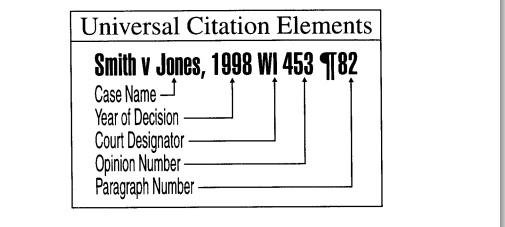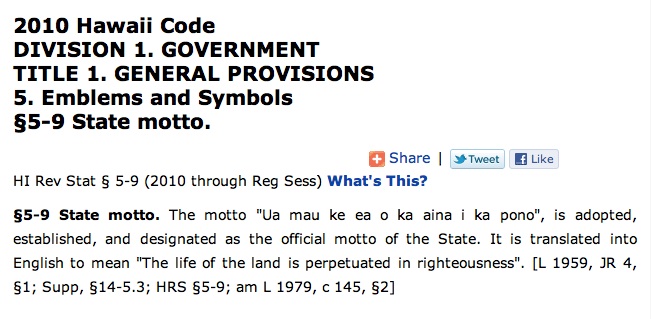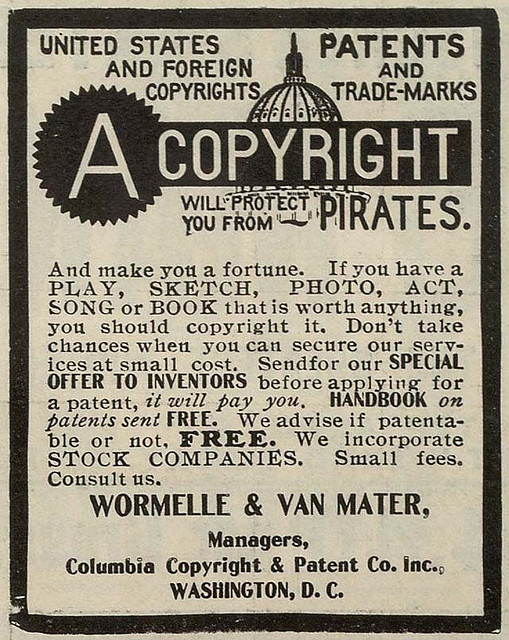
A Copyright Will Protect You From Pirates - by Ioan Sameli - http://bit.ly/lJrePv. Licensed under a Creative Commons by-sa 2.0 license
In 2008, the State of Oregon sent a takedown notice to Tim Stanley, asking him to remove copyrighted material from Justia, Stanley’s pioneering free law website. Such takedown notices are relatively common in the world of Napster, YouTube, BitTorrent, and LimeWire. However, Stanley, the founder of FindLaw, and later Justia, wasn’t publishing music or video. He was publishing the Oregon Revised Statutes on his website, and the State of Oregon claimed that Justia’s free version of the statutes was infringing its copyright.
That’s right: the State of Oregon claimed a copyright in its statutes, and it wanted to enforce that copyright against a company publishing them for free online.
The conflict was resolved amicably, with the state inviting Tim and Public.Resource.org’s Carl Malamud to Salem for a public hearing, in which the state decided to revoke its takedown demand. But the compromise was an uneasy one. Oregon did not disclaim copyright in the statutes — it merely agreed not to enforce its copyright claim against Justia and Public.Resource.org. This limited waiver means that anyone else who publishes (or quotes) Oregon statutes would face a similar specter of copyright infringement.
This may seem like an isolated incident — perhaps the work of a renegade legislative staff member with an ambitious view of copyright law. But this incident isn’t isolated. LexisNexis believes that it owns the Georgia Code. And the statutes of Colorado, Wyoming, and Mississippi. The free Websites of many state legislatures contain copyright notices warning the world that copying public law is illegal and punishable under copyright law.
Copyright in public law means that a state or a publisher could restrict fundamental rights in law. Things like copying — even citing the law in a brief — could be considered an infringing use. This makes lawyers, journalists, the public, and even judges into pirates when they quote from statutes. It subjects innovators, entrepreneurs, and other publishers, who could introduce competition in legal publishing, to potential copyright liability. It chills innovation and blocks the widespread publication of the law.
And although statutes are clearly in the public domain, they are one of the last bastions of closed-source content on the Internet. A combination of state budget cuts, our antiquated process for codifying the law, and aggressive contract terms from publishers have conspired to create private copyright claims in public law.
How did we get to this state of affairs? How can any commercial publisher believe that it “owns” our public law? Can a publisher’s claims to intellectual property in a state’s laws possibly be enforceable? And what can we do about it?
I’m tired of copyright being used to monopolize public law. This post should establish once and for all that copyright doesn’t protect public statutes, legislatures can’t grant private copyrights, and contract code publishers who mix their editorial work with state statutes can only claim very limited protection under copyright. It’s time for publishers, legislatures, and innovators to open state statutes.
How Can a Publisher Copyright Statutes It Didn’t Write?
At the outset, it seems crazy to say that publishers can copyright the law at all. After all, legislators draft, debate, amend, and pass the law, and governors sign bills into law. Most people consider statutes to be written by the people, since they are written on the people’s behalf by their elected representatives.
Publishers don’t write the law. So how can they claim copyright in it?
Raw bills signed into law by governors aren’t the same thing as the codes that appear in bound volumes on the shelves. Statutes and codes are organized into outlines, with similar topics bunched together into titles, chapters, and sections. So, for example, a state’s election laws might all appear within the same title in the state code. This “codification” process is sometimes dictated in the bill itself (especially when the bill amends an existing statute on the books), but often the codification process is left up to editors after the fact.
In addition, most codified statutes have headlines (called “catchlines” in the art) at the top of each section, and these don’t appear in the bill versions of statutes — they are later added by editors.
Codifiers and publishers add varying degrees of editorial enhancements to statutes, although many of these enhancements are pretty mechanical. Hyperlinks between statute sections or to cases, or annotations showing where statutes have been cited, are good examples of additions that are more mechanical than editorial.
Finally, in the codification process, editors will occasionally need to resolve conflicts between a recently passed law and the rest of the code section where the law will be placed. For example, some statutory titles have definitions that apply to all of the code sections beneath. When a new law with conflicting definitions is codified in that section, an editor must resolve the conflicts (sometimes requiring commercial publishers to change an enacted statute, if you can believe that).
For most states, this codification process is simply a part of the legislature’s job. They employ a team of editors in an office of codification counsel, and the legislature codifies passed bills into the state’s statutory code.
The codification process is difficult, time consuming, and expensive. Many states (and Congress) employ teams of lawyers and legislative experts who organize and annotate their enacted statutes into codified volumes for publication. However, some states outsource the editorial operations to legal publishers such as LexisNexis and West Publishing Co. (wholly-owned subsidiaries of the Anglo-Dutch publishing giant Reed Elsevier and Canadian mega-conglomerate Thomson Reuters, respectively). And, apparently, publishers require in their contracts that the state grant to the publishers all of the intellectual property in the state codes that result.
Thus we have commercial publishers who claim a copyright in state statutes.
Is a Private Copyright in State Statutes Constitutional / Enforceable?
That briefly explains why a commercial publisher is even in a position to make a claim of intellectual property in statutes. But the idea of state-owned (or private, foreign-owned) copyrights in public law is so counterintuitive, we should examine whether the claim is defensible. Is copyright in state statutes enforceable?

Crown of King Cedric Rolfsson of An Tir by Jeff Martin / Godfrey von Rheinfels - http://bit.ly/lg40hb - Licensed under a Creative Commons CC BY-NC 2.0 License
The new crown copyright?
Historians would recognize this kind of claim to copyright in state law. Before the American Revolution, the common law recognized the King’s (or Queen’s) right to copyright in a nation’s laws – the term was called “crown copyright.” Any attempts to copy or quote the law must be authorized by the sovereign. Although crown copyright still exists in the world, the United States for more than 200 years has stood for the rebellious idea that its law is owned by the people, and it may be used freely by them without the consent of the government.
The Founding Fathers considered copyright sufficiently important to address it in the Constitution’s Article I, Section 8 grant of powers to Congress: The Congress shall have the power “to Promote the Progress of Science… by securing for limited Times to Authors… the exclusive Right to their… Writings.”
It was clear enough that copyright was the purview of the people’s representatives in Congress, not of the executive. Congress removed all doubt in enacting 17 U.S.C. § 105, which establishes that works of the federal government (not just statutes, but all works) are not protectable by copyright — the federal government may not restrict the power of the people freely to use government works.
American copyright law is the opposite of crown copyright. Not only does the President not have a copyright in government works, but the entire federal government is barred from asserting copyright protection for government works.
Although the U.S. Code has little to say about copyright claims that states might assert in state codes, early American courts addressed the question several times, thereby establishing the legal framework for evaluating these claims.
Courts: State Codes Belong to the People
Courts have held time and time again that statutes may not be copyrighted, either by states or by private publishers. Some of our oldest copyright cases address issues of legal information; these cases generally held that the law is uncopyrightable. See generally L. Ray Patterson & Craig Joyce, Monopolizing the Law: The Scope of Copyright Protection for Law Reports and Statutory Compilations, 36 UCLA L. Rev. 719 (1989), and cases cited therein.
First, the Constitution limits the protection of copyright to “authors,” and courts have held that, in copyright law, government actors (whether state or federal) cannot be considered the authors of public law.
In Wheaton v. Peters, one of the reporters of early American Supreme Court opinions, Richard Peters, Jr., republished without permission twelve volumes of the reports of his predecessor Henry Wheaton. 33 U.S. (8 Pet.) 591 (1834). In its first opinion on copyright, the Court held that Wheaton could have no copyright in the opinions of the U.S. Supreme Court. 33 U.S. at 668 (“The Court are unanimously of the opinion, that no reporter has or can have any copyright in the written opinions delivered by this court; and that the judges thereof cannot confer on any reporter any such right.”)
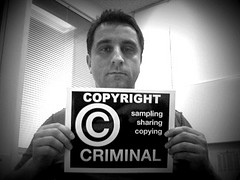
Copyright Criminal by Alec Couros: http://bit.ly/kpbOYu - Licensed Under a Creative Commons CC BY-NC-SA 2.0 License
The Supreme Court in Banks v. Manchester held that a publisher of Ohio Supreme Court opinions could not be liable in copyright, because neither the previous publisher nor the court could be considered an author under the Copyright Act of 1873. 128 U.S. 244 (1888) (“Judges . . . can themselves have no . . . proprietorship, as against the public at large, in the fruits of their judicial labors. . . . [N]o copyright could under the statutes passed by Congress, be secured in the products of the labor done by judicial officers in the discharge of their judicial duties. The whole work done by the judges constitutes the authentic exposition and interpretation of the law, which, binding every citizen, is free for publication to all. . . .”)
This rationale applies with even more force to legislatures, where statutes are written not by individual judges, but by the people’s elected representatives. If copyright law doesn’t consider judges to be authors, it certainly won’t consider a representative legislature to be one.
Second, courts have consistently held that citizens have a Constitutional due process right to have access to the laws that govern them. Because copyrights in state law limit that access, courts have time and again resolved the conflict by holding that state statutes may not be copyrighted. See Davidson v. Wheelock, 27 F. 61 (C.C.D. Minn. 1866) (publisher can’t copyright state statutes, even if state purports to give exclusive publishing rights); Howell v. Miller, 91 F. 129 (6th Cir. 1898) (“no one can obtain the exclusive right to publish the laws of a state”) (Harlan, J., sitting by designation); Nash v. Lathrop, 142 Mass. 29, 6 N.E. 559 (Mass. 1886) (“Every citizen is presumed to know the law thus declared, and it needs no argument to show that justice requires that all should have free access to the opinions, and that it is against sound public policy to prevent this, or to suppress and keep from the earliest knowledge of the public the statutes or the decisions and opinions of the justices.”)
State legislatures cannot claim copyright to their statutes, because legislatures are not considered authors for the purposes of copyright law, and because the public’s due process rights to access the law serve as a limit on the copyrightability of state statutes.
Courts: Private Publishers Face Limited Copyright for Even Their Own Work
Even where they add material to public codes, publishers’ copyright claims in that work are limited by the Copyright Clause of the Constitution and by copyright provisions in the U.S. Code.
The Copyright Clause requires that works involve some modicum of creativity, so purely mechanical operations such as adding page numbers or numbers in an outline are not copyrightable. Feist Pubs. Inc. v. Rural Telephone Servs. Co., 499 U.S. 340 (1991). The publisher of a treatise about state statutes could claim copyright protection, but a publisher could not, for example, claim copyright in mechanical operations such as adding the next number in sequence to a codification, or collecting cases that cite to a section of the code. See also Matthew Bender & Co. v. West Publishing Co., 158 F.3d 693 (2nd Cir. 1998) (pagination in caselaw reporters is insufficiently creative to merit copyright protection).
Further, when legislatures subsequently sign the original works of publishers into law, the authored works pass into the public domain. See Building Officials & Code Administrators Intl., Inc. v. Code Tech., Inc.., 628 F.2d 730 (1st Cir. 1980) (“BOCA”) (model code authored by private organization entered public domain when adopted by the State of Massachusetts); Veeck v. Southern Bldg. Code Congress Intern., 293 F.3d 791 (5th Cir. 2002) (once the government takes action and passes the model code into law, “there is no reason to believe that state or local laws are copyrightable.”).
Finally, the act of organizing new laws into the outline format of the existing code probably deserves very little copyright protection. Where a legislature amends a particular code section, the publisher’s act of processing the amendment is not creative enough to justify copyright protection under Feist: The process of placing a new law where it belongs in an existing code is often either so straightforward or so arbitrary as not to qualify as a creative act.
How Copyright Law is Applied to State Codes
Based on this discussion of copyright law, we can evaluate the copyright claims that publishers would likely make about state statutes. The following seems crystal clear:

Law Books by Mr. T in DC: http://bit.ly/uhkyk - Licensed under a Creative Commons CC BY-ND 2.0 License
1. Federal statutes (and all federal materials, really) are uncopyrightable, period. Congress has prescribed this by law, and in any event, the U.S. Code is codified by the federal Office of Law Revision Counsel, not by a private publisher.
2. For state statutes, the underlying statutes themselves are almost certainly uncopyrightable. Courts consider them to have been written (constructively) by the people, and due process requires that people have unimpeded access to the laws that govern them.
Although courts haven’t addressed the examples below, the caselaw suggests that private publishers can’t claim much copyright protection in state codes:
Where public employees of states codify, organize, annotate, or write catchlines, is the resulting compilation copyrightable by the state? Courts might hold that the organization of statutes and catchlines meet the minimum constitutional requirements of creativity outlined in Feist. (Annotations, on the other hand, which are effectively lists of citing articles and cases, are uncopyrightable “mere facts”).
However, the same due process claims that protect the public’s right to the underlying statutes also protect their right to the codified statutes, especially if the codified version is the state’s “official” version of the statutes. Moreover, states and state employees are agents of the people, and courts are likely to hold that the work product of states and state employees is owned collectively by the people in the public domain. The official code, when codified by the state, is uncopyrightable.
Where states hire a publishing company to codify their enacted statutes, is the resulting compilation copyrightable? When a state outsources its work to private publishers, the publishers are agents of the state. Under agency law, publishers could have no more claim to copyright than the contracting agent could. So if the state cannot claim copyright in its code, it cannot circumvent the copyright law by contracting the work to a private publisher.
The definitive copyright treatise Nimmer on Copyright adds that contract law is an important part of the analysis: Nimmer points out that that if the state’s publishing contract classifies the publisher’s codification as a “work for hire,” then the state owns the resulting intellectual property on behalf of its citizens. 1 M. Nimmer & D. Nimmer, Nimmer on Copyright §§ 5.12 n.29 and 5.13[B][2]. Where states specify in their contracts that contractors are performing the work of the state, are agents of the state, or are performing a work for hire, courts would be unlikely to enforce copyrights for the agent to which the principal is not entitled.
Could a publisher claim copyright in its organization of a state code? Although copyright law protects the “compilation” of otherwise uncopyrightable elements (the classic example being an anthology of poetry, in which the poems themselves have passed into the public domain, but in which the author can claim copyright for their selection and arrangement) — publishers of state codes have much less discretion in their work than do publishers of other kinds of compilations. Publishers of state codes may not, for example, decide which enacted laws to include in the code. There is no element of selection. And the code has a pre-established organizational structure that the publisher must follow in the codification process. The placement of a passed law in the code section to which it most closely relates may require skill, but it is not creative for purposes of the copyright law.
In short, courts should protect original, creative editorial work, such as articles about the law written by an author. But they should not give private publishers copyright protection where the publishers are performing functions necessary for codifying the official version of the code (such as organizing by topic or writing catchlines). Adoption of this view would protect new creative works while vindicating citizens’ important due process rights in public domain law.
Policy: Should We Root for Publishers?
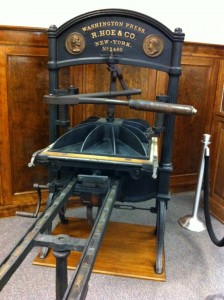
Printing Press at the GPO by Ed Walters - Creative Commons CC BY-NC 2.0 License
Commercial legal publishers would likely argue that copyright should protect their creative work. Writing catchlines and organizing codes require expertise, and are expensive. If anyone could copy the completed work, they might argue, publishers would never be able to afford to employ editors, and so would never be able to afford to pursue this line of business. Legal publishing is a for-profit enterprise, and companies should be allowed to recoup their costs, even for state work.
However, when the work is on public law, the analysis must be different. First, there are important policy implications to limiting access to statutes. Copyright is not the only way for publishers to be rewarded for their labors. And if courts choose not to enforce private copyright in public law, publishers could simply charge each state a fair rate to compensate them for their efforts.
Second, if publishers are using state contracts to create proprietary codes, the publishers are effectively receiving corporate welfare, a taxpayer-funded subsidy to create private works. Especially in times of limited budgets, states should be wary of spending taxpayer dollars in this way. Taxes are well spent to create public infrastructure, such as highways (or statutes). But taxpayers would revolt if states financed toll roads owned by foreign transportation conglomerates. Public financing of copyrighted statutes is no different.
How States Can Take Back their Codes
Just this week, the Uniform Law Commission passed the Uniform Electronic Legal Materials Act, designed as a blueprint for state laws that would require preservation and authentication of state statutes published online, while making those statutes permanently available to the public. The Act would have states designate a state employee or agency, not a private publisher, to serve as an “official publisher” of statutes for purposes of authenticating and preserving state codes. To preserve the public’s permanent access under the Act, states should take whatever steps are necessary to restore statutes to the public domain. The Act thus points to the central role that the government, not private publishers, must play in the stewardship of our state statutes.
There are some straightforward ways in which states could clear up any confusion about the copyrightability of their state statutes.
States could hire their own codification counsel, do the work of statutory codification in-house, and make clear that the end result is in the public domain. To the extent that private publishers sell proprietary versions of the code, those publishers may use the public version of the code as a starting point, and copyright their improvements. This approach is recommended as a best practice, but it may not be feasible for all states in difficult economic times.
Separately, to preserve statutes in the public domain, a state could contract with a commercial publisher for private codification services, but specify clearly in its contract that the resulting code is a work made for hire, and, consequently, is in the public domain. In this case, it would make sense for the state to require the publisher to deliver a code free of proprietary commercial enhancements so that the work may pass completely into the public domain. If publishers wish to add proprietary content, they may use the public code as their starting point. But such proprietary content would not be subsidized by tax dollars.
Finally, legislatures can simply enact the codified statutes. Congress does this with the codified U.S. Code, effectively blessing the work of its Office of Law Revision Counsel in codifying statutes. If a legislature merely enacted its code by voice vote, the Code would pass into the public domain.
Conclusion
Commercial publishers perform an important role in codifying state statutes. Their expertise and skill are vital to protecting our rule of law, which is rooted in an informed citizenry. However, statutes are by definition in the public domain, and rightly so. Efforts to own our public law, by American-owned or foreign-owned publishers, violate both our understanding of copyright and our due process rights to access the laws that govern us. When states work together with private publishers to codify their official statutes, neither law nor policy suggests that the publishers may own the resulting codes.
 Ed Walters is the CEO of Fastcase. Although nobody at Fastcase believes statutes are copyrightable, the company has no plans to be the test case for this proposition, thank you very much. Views expressed here are his own.
Ed Walters is the CEO of Fastcase. Although nobody at Fastcase believes statutes are copyrightable, the company has no plans to be the test case for this proposition, thank you very much. Views expressed here are his own.
VoxPopuLII is edited by Judith Pratt. Editor-in-Chief is Robert Richards, to whom queries should be directed. The statements above are not legal advice or legal representation. If you require legal advice, consult a lawyer. Find a lawyer in the Cornell LII Lawyer Directory.






